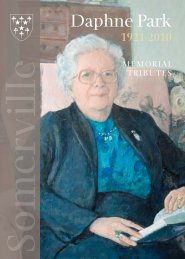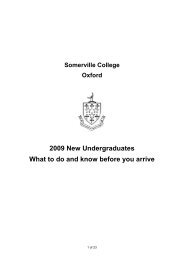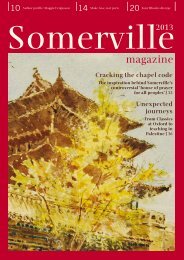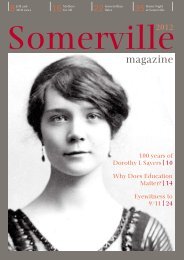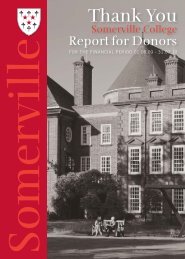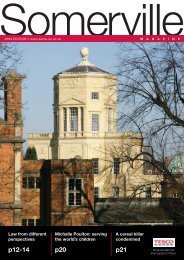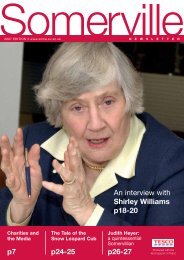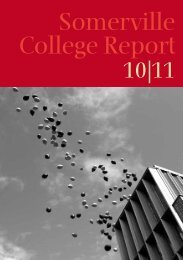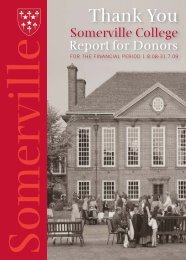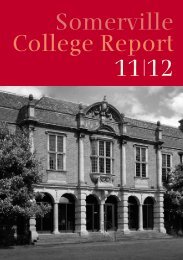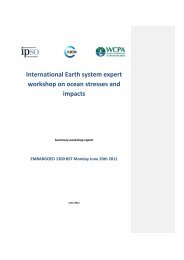magazine - Somerville College - University of Oxford
magazine - Somerville College - University of Oxford
magazine - Somerville College - University of Oxford
Create successful ePaper yourself
Turn your PDF publications into a flip-book with our unique Google optimized e-Paper software.
8 | <strong>Somerville</strong> Magzine<br />
Four generations<br />
and an FRS<br />
(l – r)<br />
Liz, Angela and Florence Mclean<br />
Congratulations to Angela McLean on becoming a Fellow<br />
<strong>of</strong> the Royal Society – but also to her family on achieving its<br />
fourth consecutive generation <strong>of</strong> Somervillians.<br />
Long gone are the days when Mary <strong>Somerville</strong>, as a<br />
woman, could not be a full and participating member<br />
<strong>of</strong> the Royal Society. Since then <strong>Somerville</strong> has<br />
produced a bevy <strong>of</strong> FRSs to be proud <strong>of</strong>, ranging<br />
from Dorothy Hodgkin, Nobel Laureate, and her<br />
pupil, Margaret Thatcher, to more recent members<br />
<strong>of</strong> <strong>Somerville</strong>’s Governing Body, Pr<strong>of</strong>essors Louise<br />
Johnson and Carole Jordan. So there was great delight<br />
in <strong>College</strong> when the most recent Somervillian election<br />
to Fellowship <strong>of</strong> the Royal Society, Pr<strong>of</strong>essor Angela<br />
Mclean, was announced in May 2009.<br />
Angela came up to read Mathematics at <strong>Somerville</strong> in<br />
1979 and her current work in epidemiology includes<br />
producing the fi rst mathematical models <strong>of</strong> the<br />
evolution and emergence <strong>of</strong> vaccine-resistant strains<br />
<strong>of</strong> infectious agents.<br />
Angela works in the Zoology Department and at All<br />
Souls, where she is Senior Fellow in Theoretical Life<br />
Sciences. Her work focuses on the spread and evolution<br />
<strong>of</strong> infectious diseases. In Zoology she is one <strong>of</strong> the<br />
two directors <strong>of</strong> the Institute for Emerging Infections,<br />
a founding Institute <strong>of</strong> the <strong>University</strong>’s James Martin<br />
21st Century School. The mission <strong>of</strong> the Institute is to<br />
understand the underlying processes that drive the<br />
emergence and spread <strong>of</strong> novel human infectious<br />
diseases. The institute is staffed by a multi-disciplinary<br />
team <strong>of</strong> biologists, mathematicians and clinicians who<br />
are studying recently emerged infections and using the<br />
knowledge thus gained to anticipate challenges that<br />
will be posed by novel emerging infections in the 21st<br />
century. In order to understand how infections change<br />
as they spread the research simultaneously considers<br />
events inside infected people and transmission<br />
between people. This makes it different from most<br />
research in infectious disease, which is either about<br />
infected individuals (immunology and virology) or about<br />
infections in communities (epidemiology).<br />
Angela is also involved in giving scientifi c advice to<br />
the UK government. She sits on advisory boards at the<br />
Department <strong>of</strong> Health and at Defra where she is able<br />
to share her expertise in infections, risk and<br />
mathematical modelling.<br />
Angela’s arrival as a fresher in 1979 was by no means<br />
her first introduction to <strong>Somerville</strong>; she comes from a<br />
Somervillian dynasty. With the arrival in October 2009 <strong>of</strong><br />
her niece, Florence McLean, to read Medicine, her family<br />
can claim four consecutive generations <strong>of</strong> Somervillians.<br />
First <strong>of</strong> the family group was Angela’s grandmother,<br />
Mathilde Hunter (née Bugnion), universally known<br />
as “Thilo”, who came up from Switzerland in 1917 at<br />
the age <strong>of</strong> 21. Her year included Cicely Williams and<br />
Winifred Holtby. Janet Vaughan FRS, though not in<br />
this intake, overlapped them forming a strong cohort<br />
<strong>of</strong> medics. At this time <strong>Somerville</strong> was evacuated to<br />
Oriel, the <strong>Somerville</strong> buildings being taken over by<br />
the Radcliffe Infi rmary for War wounded. Young lady<br />
undergraduates went chaperoned to tutorials with male<br />
tutors. They asked permission <strong>of</strong> each other before<br />
addressing a new acquaintance by her Christian name.<br />
Thilo, who had attended an English sixth form before<br />
starting university studies in Switzerland spoke English<br />
with extreme fl uency, but some <strong>of</strong> the nuances still<br />
escaped her, as, when, confronted by a beetroot salad<br />
in Hall, she innocently enquired, “What is this bloody<br />
mess?” Having left pr<strong>of</strong>essional life on the arrival <strong>of</strong><br />
her third child in the 1930s, she was then catapulted<br />
in 1940 into the position <strong>of</strong> Head <strong>of</strong> Clinical Chemistry<br />
at the <strong>University</strong> Hospital <strong>of</strong> McGill in Montreal, a<br />
position which she held throughout the war. There<br />
she (a native French speaker) presided over a team<br />
<strong>of</strong> French Canadian technicians who would not speak<br />
French to her because, being a “boss”, she merited<br />
communication only in English. Such, at that time, was<br />
the gulf between the social classes in French Canada.<br />
ANGELA MCLEAN<br />
(1979, Mathematics,)<br />
and LIZ MCLEAN<br />
(Hunter, 1950,<br />
Physiology)<br />
to understand<br />
how infections<br />
change as they<br />
spread



